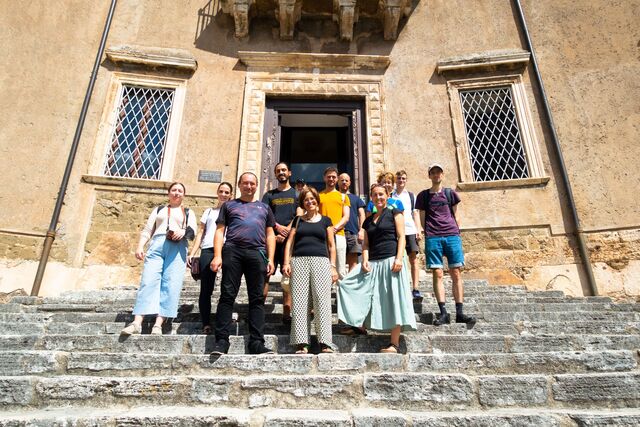From 5 to 10 September 2022 Franco Ripa di Meana and his colleagues from ABARoma invited master students, PhD students and other graduates of the partner universities from EU4ART to a Summer School in the Casa San Silvestro in Monte Compatri near Rome. The programme included four intensive days full of lectures, workshops and exchange between the graduates. Each university sent five graduates, who were accompanied by one or two teachers. Representatives of the Dresden Academy of Fine Arts were Peter Wackernagel as lecturer, Viktoria Ovsepian, Nele Hartmann and Claus Schöning as scholarship holders of the pilot phase for the Third Cycle project at HfBK, and Stefan Schleupner as well as Johannes Mario Kiel, accompanied by Claudia Reichert and Till Baumhauer project coordinators for EU4ART_differences.
From a thematic point of view, the event circled aspects of the field between artistic practice and new digital strategies in the creative field. The morning sessions took place as online lectures on TEAMS and were open to a broad audience, while the afternoon workshops were exclusively open to Summer School participants.
The morning of 6 September addressed issues of artistic entrepreneurship, with university interfaces into the creative industries, as well as questions about blockchain processes and authorship. This was contrasted with a workshop with Stine Marie Jacobsen in the afternoon, which tested group behavior and perception in the context of the summer school under the title “Group-Think.” On Wednesday, 7 September, gamification in the context of museum practice, heritage and and creativity was the main topic, flanked by a workshop on ecological issues by Cinzia Pietribiasi, Junior Scientist at ABARoma. On the following morning, the focus was on virtual reality, neuroscience and the humanities in relation to art practice; the afternoon workshop was designed by Michael Hiltbrunner (ZHdK) on the basis of an archive on strategies of Artistic Research from the 1970s. The final day, 9 September, explored issues of artificial intelligence and brought the week to a close with a workshop by Luigi Pagliarini on robotics and group dynamics in artistic work processes.
Big thanks for the organization of the summer school go to Franco Ripa di Meana, who together with his colleagues put together a fascinating programme and ensured that doctoral students and graduates from all partner universities had the opportunity to meet and exchange ideas for the first time in person. Thus, the summer school lays the foundation for further close cooperation in the EU4ART_differences research project for the coming months and years.
